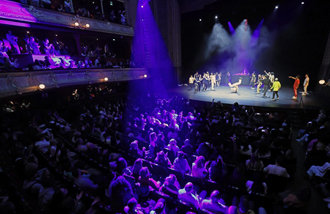Tension between Soccer Fans Strains Chinese-Japanese Diplomatic Relations
Tension between Soccer Fans Strains Chinese-Japanese Diplomatic Relations
Posted August. 06, 2004 22:11,
China: Kong Quan, spokesman of Chinese Foreign Ministry, urged Chinas soccer fans to enjoy soccer in a civilized fashion. Even Chinas media has started to call for order.
Chinas Youth Daily posted an editorial that stated, Even though we are focused on Japan, we must not forget that the world is watching us more than them. Despite the fact that Japan does not apologize for their past history, we must refrain ourselves from engaging in disgraceful actions that will make our country be perceived as a nation that does not know the rules of fair play and sportsmanship.
However, an aroused Chinese netizen did not seem to comply. Extremely frustrated, he asserted, The finals isnt merely a soccer match, but a battle that must be fought and won. Letting Japan win in Beijing, our nations capital once seized by Japanese forces in the past, is an act of defiling our nations capital.
Also another netizen asserted, China, a nation well known for its tolerance for others, has no other option than to seek revenge from Japan, a nation that stubbornly refuses to reflect upon its past actions. Victory is key in revenge.
Six thousand police officers are being placed at the stadium during the finals, and 1,000 police officers will surround 2,000 Japanese soccer fans, separating them from Chinas fans in order to prevent any violent uprisings.
Tickets to the Finals Have Been Sold out
Of the 43,000 tickets, the 200-yuan (approximately 30,000 won) general seats sold out on August 4, the day tickets sales began, and currently these tickets are being sold illegally by four times their original price at 800 yuan (approximately 120,000 won).
Other than the tensions in football, the Hong Kong Wen Wei Po (Hong Kong-based Chinese language newspaper) reported that over 1,900 Chinese hackers have participated in attacks against websites of Japans premier office, Japans Ministry of Health Labor and Welfare, and the Yasukuni Shrine from August 1 to August 6.
Wen Wei Po also reported that the recent cyber attack was carried out in retaliation after a Japanese hacker, on July 25, hacked into and stole data from the China Federation of Defending Diaoyadao (Senkoku archipelago in Japanese) website (www.cfdd.net), currently the location of an international territorial dispute between the two nations.
Japan
The Japanese government and media have perceived the recent Chinese reaction to the soccer finals as a threat to the safety of all overseas Japanese citizens residing in China.
During the week, the Japanese embassy advised on their Internet homepage not to go near the Chinese spectators out of curiosity and not to wear the Japanese uniform outside the stadium.
However, the Japanese government is concerned that this situation may spread to other countries, and are refraining from using provocative expressions towards the Chinese government and soccer fans.
The Mainichi Newspaper interpreted in its August 6 article that the jeering from the Chinese spectators to the Japanese players was the product of anti-Japanese education and patriotism. It has also pointed out that the cause for this matter was the exclusive nationalism of the Chinese.
Television broadcasters covered this matter centering on interest on both Thursday and Friday, reporting as if the jeering from Chinese soccer fans may grow into a violent situation.
On August 5, at the Liberal Democratic Party assembly, members stated, What we must say of China, we must say, Recent tensions are the result of the Chinese governments anti-Japanese education, and If any troubles are to occur between our two countries, any diplomatic relations achieved post World War II will collapse. The assembly called for strong actions against the Chinese reaction.
Yoo-Seong Hwang Hun-Joo Cho yshwang@donga.com hanscho@donga.com







